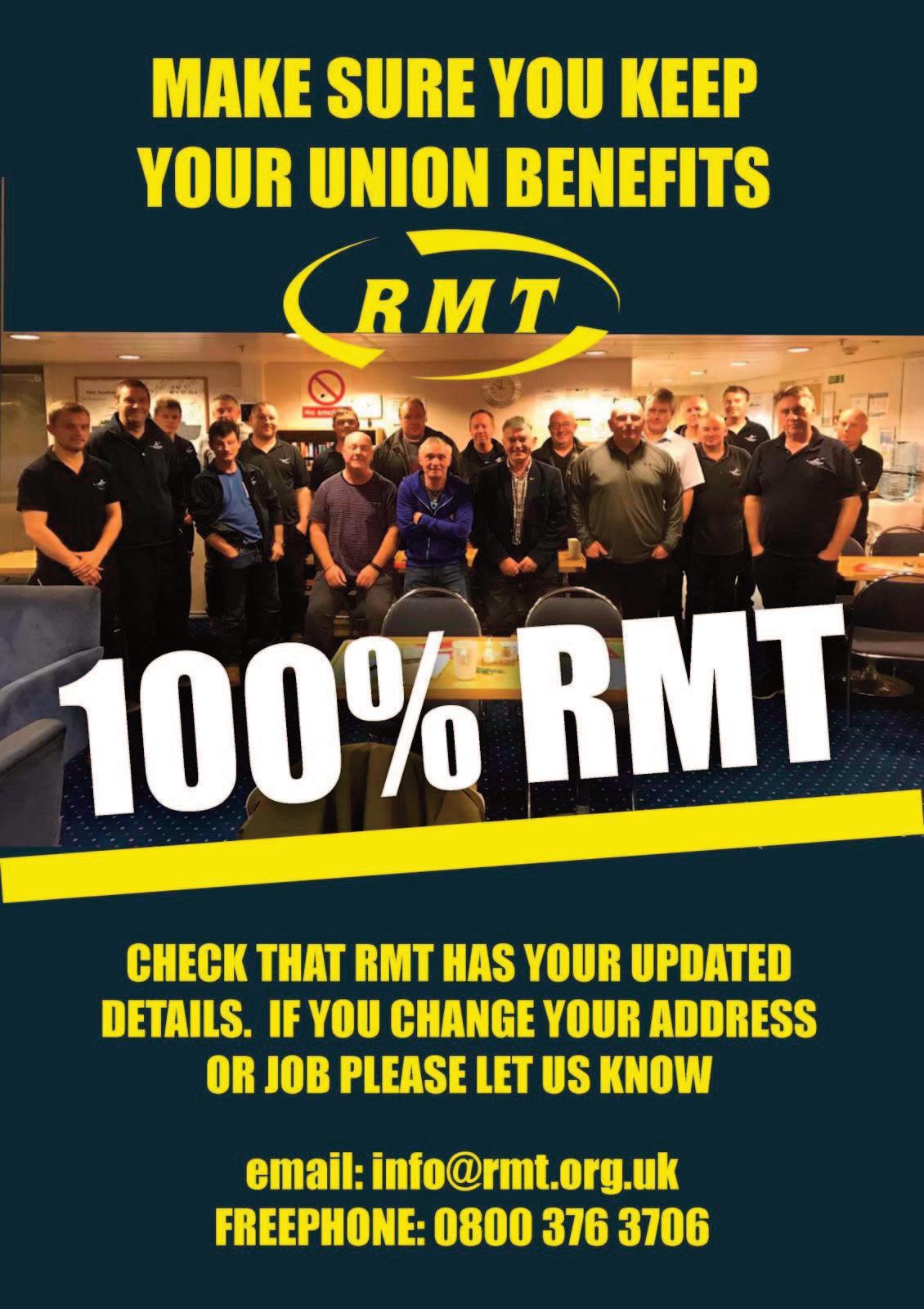Seafarer




Our union structures has many vital cogs in its machinery, but none more so than our workplace industrial reps, They are the vital cog that makes your NEC, Lead officer and National officers aware of the problems you and your colleagues face within your workplace. Workplace industrial reps are trained and ready to respond when you are likely to need help most and can advise how to access and utilise your RMT membership in full.
As a workplace industrial rep, you’ll learn how to provide advice and representation on employment rights and terms and conditions, you will be educated by the union in how to represent members at disciplinary and grievance hearings and be RMT’s conduit in your workplace promoting equality, recruitment and union training.

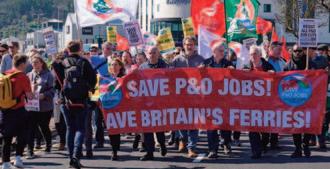

I was an industrial rep for over 10 years, at times I felt a huge responsibility dealing with members and often friend’s issues, but nothing is more rewarding than getting a member reinstated, a good settlement or fixing an injustice onboard your vessel. Nothing is more satisfying than being part of a strong collective and being trusted by your peers to be the person they want representing them in these circumstances.
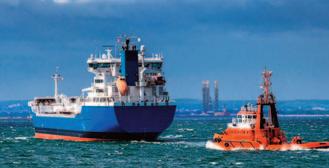

A well organised workplace on average earns 28% better wages than a nonunionised workplace, is safer place to work
and forces employer engagement. If you don’t have a workplace rep, you’re sending the green light to employers to attack you terms and conditions and impose what they wish, if you don’t have a rep why not volunteer yourself? We have to be more organised than we ever have and that starts with have well trained, well supported reps on every watch on every vessel.
If you’re standing back waiting for someone else, you’re part of the problem. The RMT will provide you with all the training you need, you will be supported with everything at our disposal, so lets improve how organised we are on every vessel by maximising the amount of reps we have and working together as a collective to best represent you and your colleagues.
I can be contacted at s.miskimmon@rmt.org.uk for more information about becoming involved as a representative.
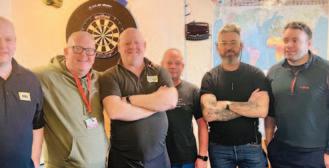
I am very pleased to introduce another edition of RMT’s The Seafarer, the specialist publication for RMT’s maritime members. Our members on ferries, scientific research, offshore, PNTL, cruise and RFA vessels keep the country going and I pay tribute to your skilled and essential work.
I am very pleased to introduce another edition of RMT’s The Seafarer, the specialist publication for RMT’s maritime members. Our members on ferries, scientific research, offshore, PNTL, cruise and RFA vessels keep the country going and I pay tribute to your skilled and essential work.
We continue the fight for justice for seafarers affected by the P&O Ferries scandal, with your National Secretary Darren Procter leading from the front. The Government’s Seafarers Wages Bill has been a focus of that fight. The Bill proposes a complicated mix of a minimum wage equivalent, port access surcharges and bilateral agreements which do not strengthen seafarers’ rights.
Despite repeated efforts in the Lords to amend the Bill, it remains far too narrow and legally complex to succeed in damaging the crewing model of P&O and other operators who are cashing in at seafarers’ expense. The Bill will be in the Commons soon and we will be working very closely with the Parliamentary Group and cross party MPs to amend it to the benefit of Ratings.

Since the last edition, we have had three Prime Ministers, three Transport secretaries and a new maritime minister, who sits in the House of Lords. None of these have dealt with the problems at the heart of the shipping industry.
We are absolutely clear that the Government banging on about seafarers and the national minimum wage won’t cut it – they took ten years to extend the NMW to domestic routes and even then Tory ministers left out offshore renewables and did nothing on international routes! Even employers’ body RenewablesUK agree that this needs correcting, along with
RMT’s The Seafarer is compiled by National Union of Rail Maritime and Transport Workers, Unity House, 39 Chalton Street, London NW1 1JD. Tel 020 7387 4771.
The information contained in this publication is believed to be correct but cannot be guaranteed. All rights reserved. General editor Brian Denny. No part of this journal can be reproduced without prior written approval of RMT. No liability is accepted for any errors or omissions. © RMT 2022.
Members
tackling immigration concessions which are damaging seafarer jobs and livelihoods during a cost of living crisis.
Too often, it’s one step forward and two steps back in maritime, and members at Royal Fleet Auxiliary have seen that again. The contract for new RFA Fleet Solid Support ships may have gone to domestic shipyards but the employer is trying to force our members to accept yet another measly pay award. Meanwhile, inflation is rocketing, with RPI hitting 14.2%. RFA members were absolutely right to reject an insulting offer which comes off the back of a decade of public sector pay restraint.
As the Fair Ferries and SOS campaigns underscore, we are determined to persuade politicians regulate the labour market in favour of our Ratings, to increase apprentice numbers and to reform the Red Ensign to restore the link to local jobs rather than competing with flags of convenience. With political will, this can be done and Shadow Minister Mike Kane MP’s recent skewering of Irish Ferries was encouraging on that front.
A genuine bright spot is the Maritime Skills Commission’s Ratings Review, which will begin shortly and report in March. In the summer, it was announced that employers training Cadets can get 50% of the cost reimbursed by the taxpayer. It makes no sense for it to be cheaper to train Cadets than Ratings and we need urgent action, through the Merchant Navy Training Board too. Members will be contacted as part of the Review and we will make sure that it delivers for Ratings in every part of the country.
I’d like to wish all our maritime members a happy Christmas. We enter the New Year with renewed vigour for the political and industrial campaigns ahead for all our seafarer and port members. A key New Year’s resolution for all of us must be to ensure everyone is in the union. If you know anyone who isn’t they can join by going online at https://join.rmt.org.uk/app/#/welcome
Together we are stronger.
Please write to the Editor at Unity House, 39 Chalton Street, London NW1 1JD or email: theseafarer@rmt.org.uk
 Mick Lynch, General Secretary
Mick Lynch, General Secretary
I recently presented a policy paper to the Merchant Navy Training Board regarding the training and development needs of UK ratings, the shortage of skills and opportunities to overcome those barriers currently in place. I am pleased to report that it was taken positively and we must now develop dialogue with the MNTB board members, individual companies and training providers to seek support, develop quality arguments and address our concerns accordingly.
Since the last edition I have been on a number of vessels at companies including RFA, Foreland, IOMSPCo, Stena, Sodexo Bateaux and City Cruises on the Thames and I have been involved with meetings at National Oceanography Centre, James Fisher and C-Wind. I also regularly make courtesy calls to our seafarers members to ensure that contact details are up to date and correct and talk to members about their current employment status and any concerns they have along with an opportunity to identify any areas where we could be doing better.
Over the next couple of months we will be looking to place a particular focus on education and development, we have a new education officer in place and due to the pandemic we have a number of reps
and activists that have undertaken very little training or development and we will look to address this.
I hope you find this edition of the seafarer an interesting read, I think each edition is becoming more informative

and wide ranging but its also good to see some of the maritime branches putting their own content together for newsletters and updates specifically aimed at those employers within region.

As we approach the end of the year I would like to pay particular tribute to our representatives in each and every workplace for their continued effort and support in representing your interests as a member of RMT, sacrificing their own free time, dealing with your issues and supporting you and your colleagues 24/7 whilst onboard and often at home.
I would also like to thank our head office staff for their tireless contribution and research behind the scenes who are central to everything that we do as a union and contained within this edition are articles from various departments to give a greater understanding of the work that they undertake and how important their role is in supporting our seafarer members.
 Darren Procter, National Secretary
Darren Procter, National Secretary
As the year draws to a close and we continue the battle for a seafarers wages bill to tackle P&O’s despicable actions, we are seeing other examples of exploitative practices affecting seafarers, including being charged for sleeping onboard vessels, being replaced in the renewables sector due to immigration waivers and seafarers being concerned for their safety due to venting of gases without warning in refineries.
Stuart Morrison, Shipboard representative and branch Secretary of Harwich Shipping has been a shipboard catering representative for the past 22 years and national representative & branch secretary for the past 3 years. In this time, he has seen the importance of having meetings with local Dutch management to discuss and rectify local issues for our region area North Sea.
In the past we met once per year, with meetings held in the Stena offices in Harwich where the regional organiser would attend along with the shipboard representatives. These meetings would discuss manning issues, reduction in UK seafarers due to replacement by cheaper labour. And as a union we always were on the back foot and found ourselves trying to protect the jobs we had onboard.
We had a manning level agreement of 86 UK registered seafarers on area North Sea which was only in place for set period of 3 years but continued until 2019 when the company informed RMT that they wished to bring in a new matrix with alignment to the Dutch flagged vessel Stena Hollandica. After many meetings with our National Secretary/Assistant National Secretary and Regional Organiser Steve Smart we reached an agreement, which protected 60 UK seafarers and was a once and for all agreement. And that was its title. To reach the agreed number
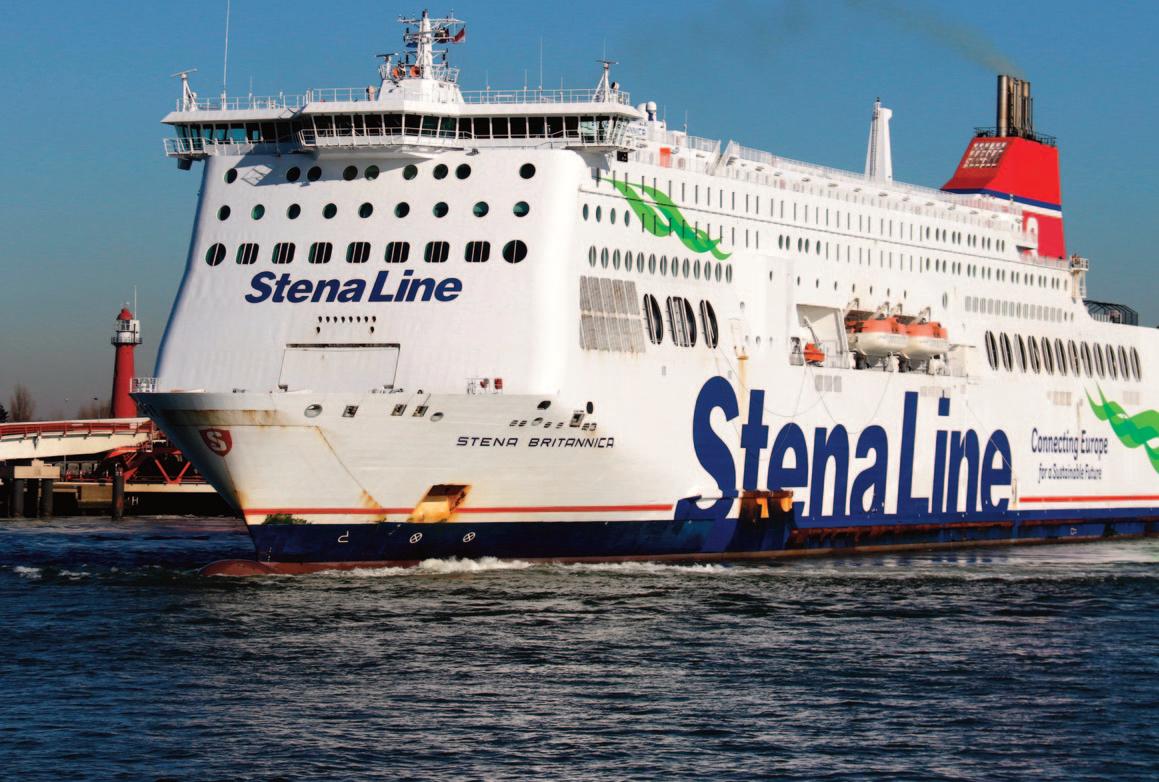
there was no compulsory redundancy, but the company had age profiled our members and knew there would be an uptake in voluntary redundancy. In this period of the new agreement, we lost all but myself as a shipboard RMT representative.
Then during the pandemic, the company decided to attack our grades within the Onboard services, and after the once and for all agreement stated positions protected and grades, this was a step to far for our members and a stand against the company was made. With the line drawn in the sand the company withdrew their attack on our grades in Harwich. This showed both the company and our members the power we have when we all stand together. And although it was not the company’s intention it made us as members of RMT united and members see what we can do if we make a stand and show solidarity. After years on the back foot, we pushed back and won
our corner. Which has empowered us as a union onboard.
We have since gone from strength to strength, Having now five ships representatives in place and two health and safety reps and a mental health rep in place for training within the RMT structure. And are now increasing membership of our union having lost older members though retirement and the last round of voluntary redundancies.
With the support of our national secretary Darren Procter and outgoing regional officer Steve Smart, both of whom visit the ship and show their support we have now organised 3 monthly meetings with Dutch management and Andrew Shaw, These meetings take place onboard Stena Britannica during a 24 hour period where our reginal officers and crew met prior to meeting management in the afternoon during crossing back to Harwich.
We have had three of these meeting
so far and the next one scheduled for September; we have changed some of the wording in our local agreement to suit both parties and brought various local issues to the management team. Due to Steve Smart retiring we have a new regional organiser who has hit the ground running and is an asset to us in these meetings, and the constant support she offers to us onboard. Points raised at these meetings are given deadlines for answers and a matrix is given to RMT at the end of the meeting with period for these answers to be given. We also send an agenda of items for discussion 2 weeks prior to meeting, so the management are in a position to answer the questions and actions within the meeting instead of the old answer of we will get back to you. Minutes agreed from previous meeting and signed off by both RMT and the company.
These meetings are a win win situation for us on Stena Britannica, members see their regional organiser a minimum of 4 times a year sailing with us onboard for a 24 hour round trip, answering questions and updating members in person and at our shipboard meetings held prior to meeting with management with any other issued raised going onto any other business on the agenda with Dutch management. Local issues are dealt with at a local level and
not escalate to national level unless we feel the need to if our concerns are not addressed at the local level. All of our union representatives are in attendance of these meeting along with our regional organiser Kathy Mazur. Our meetings are arranged for the changeover day so reps going off stay onboard on recall to attend the meeting, and not disrupt their leave by having to come back for 24 hours in the middle of their week off.
In the eyes of our members the union is actively a presence and helps the reps onboard bring potential new members onboard. We as members onboard are the union, And the more members we have going forward makes us a stronger force going forward. The company now know that we if pushed will fight back as they found out while trying to down grade our
members, when the entire crew stood firm together and were going to ballot for industrial action over this. The company had treated us as a toothless animal which they could prod at any time, this they now know is not the case and we will defend our local agreement to the full.
I can say without question that the local management are listening to us now at our meetings and various issues have been resolved or in the process of being resolved. All ports should be having these types of meetings with local management of the company. It gets the members attention and helps deal with issues that are at a local level.
The members are the union not some building in London, when we as reps are asked what is the union doing for us, Well we as members are the union and should encourage others to join to make us stronger, and be prepared to rally against cheap labour taking their jobs or other shipping companies, stand up and protect their terms and conditions. We did it in Harwich, and the empowerment we have gained as a united group of RMT members has taken the beating stick the company used for many years away from them.
Stuart Morrison Shipboard representative and branch Secretary of Harwich ShippingIn recent years we have the issue of crew food being brought up, whether this be around budgets, supplier costs, quality or choice. Cooks have a very tough job onboard vessels but that job has just become more problematic given the rising costs of food and shortages of certain products. The quality and quantity of food along with nutritional balance is something that is scrutinised on a daily basis but what impact is the cost of living having on your vessels’ budget?
• Have you seen a noticeable difference in choice or quality?
• How is this impacting those with responsibility for crew food?


• What about those seafarers on smaller vessels who are not provided with a crew cook and given a daily allowance for food?
• Is this being discussed amongst members?
Since the introduction of refresher training for the STCW certification in 2015, I found myself, in the role of Branch Secretary of the Belfast Shipping Branch, being contacted regularly from unemployed members enquiring about renewing their certification.
Our branch officials began assisting members in applying for funding via the MEF to assist our unemployed seafarers in paying the course costs, but it soon became apparent that this was not the only obstacle. Whilst we were grateful of the financial help provided by the MEF to the members, the next challenge was travel to and from the training facility and the additional cost of accommodation when attending.
This was how the idea of Lagan Marine came about!! Why were seafarers from Ireland having to travel to the mainland UK to complete MCA approved courses? The simple answer was that there was no training facility in the North of Ireland.

And so it began……. We started searching for premises to work out of that would provide office space, classrooms, workshop etc and were fortunate enough to source a building that was central to Belfast city centre with easy access to the motorway and public transport routes. After refurbishing and fitting the centre out with tables, TV’s, laptops, printers,
scanners and all the necessary equipment needed to run the courses, we needed to come up with a name.
This was probably the easiest decision we had to make with Belfast’s proud maritime history it seemed an obvious choice to name ourselves after the river that runs through Northern Ireland and into Belfast Lough. Lagan Marine, we now had a name and registered our business with Companies House.
The next step in the process was to commence building the courses and to then have them approved by the MCA. This sounded like a quite straightforward process, but the reality was that an enormous amount of time and effort was needed to accomplish this. Each course had to be built as per the Merchant Navy Training Board criteria, this was then sent into the MCA for desktop approval. Once they were satisfied, the MCA would then have to come out to our training centre and witness a course being delivered live. This must be done for every individual course, so it has taken a considerable amount of time to complete. Every piece of equipment associated with each course also had to be purchased from EPIRB’s and SART’s to lifejackets, life rafts, immersion suits, fire suits, BA sets, fire hoses, nozzles… the list is endless and the costs keeping rising. I was beginning to realise there was perhaps a few reasons why we haven’t
had a training centre in Northern Ireland as it is no easy task building from scratch.
But here we are, almost three years in from when we started, we had survived Covid and all its challenges, with regards to not only running courses but getting them approved. We now have all the basic STCW courses and refreshers. We have built our own fire school and are working on the next phase which will be building a davit and sourcing a lifeboat and fast rescue craft so that we can add these courses to our ever-growing list.
When we started the process of building a maritime training centre in Belfast, it was due to the absence of such a facility in our region and the fact that to achieve the required accreditation, seafarers had to travel the length and breadth of the UK. We knew that having a facility here would be a huge benefit to seafarers and especially those who may be unemployed.
Assisting seafarers in all their training needs is our main priority but we pride ourselves on the fact that we offer much more than just the required courses. Anyone using our facility will be given the opportunity to sign up to our database for employment. We are constantly in contact with numerous companies who we update regularly on the availability of trained seafarers seeking employment. We also help with CV building and interview
techniques in the form of a free of charge half day course, which we believe will give those seeking work, the best chance of securing gainful employment. We assist with organising seafarer’s medicals and providing transport if needed and we are constantly working with local communities and maritime organisations to try and secure funding for those that need it.
It’s been a pretty hectic few years getting Lagan Marine off the ground. We thought at one stage Covid and the lock
downs would shut us down. Thankfully we preserved and continued to throw everything at it and the hard work is starting to pay off. Over the past 12 months, we have trained almost 200 seafarers on various courses. We have been working with a local ferry company (Not P&O) and numerous windfarm firms and secured more than 100 jobs, both full time and seasonal.
We are currently in the process of building GWO courses that are specific to the windfarm industry and hope to be
able to deliver theses soon. We believe that this sector of the maritime industry has great potential for employment opportunities for UK seafarers so it will be our aim to train and promote UK seafarers through our rapidly growing data base.
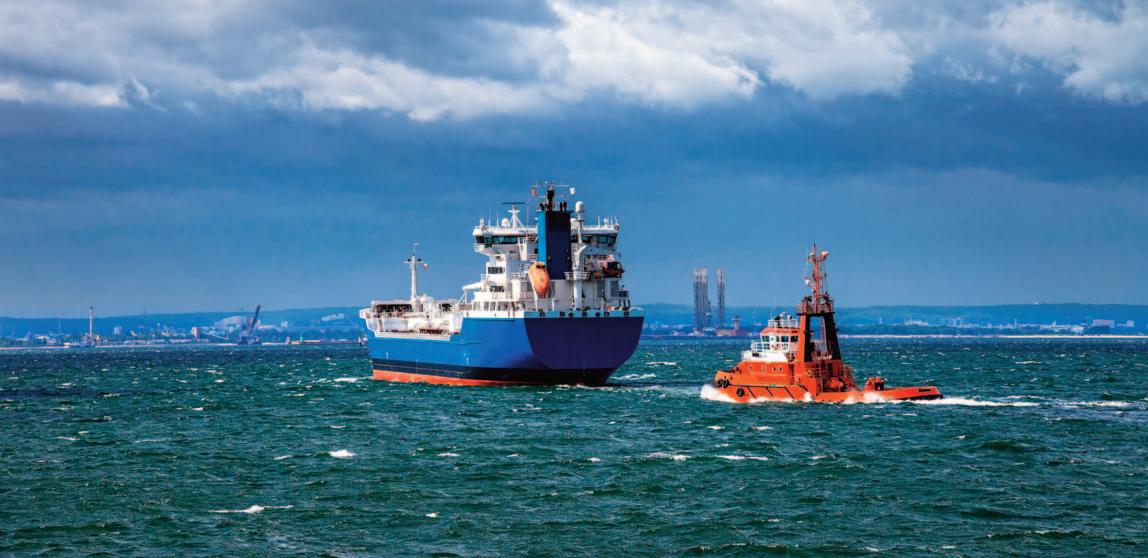
For any enquiries, questions or assistance, please email contact@laganmarine.co.uk and we will do all we can to help.

Lagan Marine is a newly established training and recruitment centre based in the heart of Belfast. We deliver STCW MCA approved courses to the maritime industry, including the growing windfarm sector. Our headquarters are perfectly located in the centre of Belfast in Northern Ireland, easily accessible via all transport links and with a wide selection of accommodation available within close proximity of our premises. We pride ourselves in going the extra mile to ensure that our students have a worthwhile experience and leave us knowing they have the understanding and confidence to carry-out their expected duties. If an exam candidate is struggling or requires additional support, we will be on hand to provide that extra support to ensure competence is achieved.
Delivering optimal value for our customers is a priority at Lagan Marine, we can facilitate individual, group and company bookings. We can also customise a training schedule if needed for your company. With the number of qualified in-house tutors, we have the flexibility to deliver training in the evenings and over weekends.
All aspects of Lagan Marines operations are performed in accordance with our Quality Management System and the rigours of the ISO standard, in addition to the strict regulatory requirements of training approval bodies such as Maritime and Coastguard Agency (MCA) and Merchant Navy Training Board (MNTB).
The aim, objective and success of our learners is to deliver a high-quality learning experience in an environment that educates, informs and gives an overall enjoyable learning experience. Quality and customer satisfaction is at the heart and core of our business and we welcome feedback from visitors, staff and delegates as to how we can continually improve the quality of our programmes and in-house offerings.
Sometime during the summer of 2020, we started hearing a phrase relating to the offshore workforce, ‘Just Transition’. Even the environmental NGOs, once totally hostile to oil and gas workers, were on board for demanding a just transition for the workforce. The idea goes back to when the coal mines were closed in the 1980s, where whole communities were abandoned with little hope, which has led to social and economic problems in these communities that are still ongoing today two generations later. A similar situation occurred in Fife in 2016, following the closure of the Longannet coal-fired power station, where the Scottish Government’s own Just Transition Commission concluded that there was a ‘strong feeling among local people that their voices had not been heard’ with ‘no transition plan in place for the community’. The ‘Just Transition’ plan for the offshore workforce would see the predominantly North East Scotland workforce transition into the new renewables sector, thus avoiding the social and economic problems that occurred in the mining communities occurring in North East Scotland.
For just transition to work, the general opinion is that Certificate Passports are needed. This would see those that are, say, OPITO trained, able to transfer their skills to the wind sector without having to duplicate courses under GWO. A simple solution to a complex problem you might think, but not according to the training providers, trade bodies and lacklustre governments in Westminster and Holyrood. Training providers don’t want to lose the cash-cow of duplicate courses under OPITO, GWO and STCW, trade bodies want to guard their own fiefdom jealously, and governments, after years of feting the
offshore industry and the money it provided to the economy, have now used the industry as a climate-change scapegoat, thrown it under the bus, and are, at best, lukewarm to the plights of the industry.
to do both. On top of this, if I wanted to get into the wind industry and do my 5 module GWO basic training, this would cost me a minimum of £1246.50, not including travel and accommodation. The 5 modules are First Aid, Manual Handling, Fire-Fighting, Working at Height and Sea Survival, again all duplicate certificates, what is the difference between GWO and OPITO Working at Height? Suspension trauma is still the same no-matter what certificate you have. There is also now a GWO Banksman/Slinger course, can anyone tell me what the difference between this and the OPITO course is, all it leads to is confusion and very rich training providers.
Let’s get this straight; there will be no just transition without certificate passports. I read somewhere recently that upwards of 80% of offshore workers now pay for their own certification after the changes of the last 7 years. As a marine operative in the offshore industry, since being made redundant last summer, I’ve had to renew several certificates, both OPITO, FOET, Further Emergency Team Member, Twinfall Coxswain Refresher, MIST, Banksman/Slinger Stage 4, and Stability 3, and STCW, Basic FireFighting, Advanced Fire-Fighting, Personal Survival Techniques and Proficiency in Survival Craft and Rescue Boats. As it is, several of these courses are almost identical, OPITO Further Emergency Team Member and STCW Basic Fire-Fighting are very similar, but cost me nearly £1300 to do both, and OPITO Twinfall Coxswain and STCW Proficiency in Survival Craft are basically the same course, but cost me nearly £700
One final point, is it even worth transferring to renewables? Around 60% of those working in the industry are exploited foreign labour on rates of pay that domicile workers couldn’t afford to work for; I was offered a ‘fantastic opportunity to get work in the wind industry’ the other week as crew on a Crew Transfer Vessel, as well as all STCW certification, I was also expected to get a GWO Working at Height Certificate, the wage on offer was £120 for a 13 hour day, no benefits, no pay when off, either 2 on/2 off or 4 on/2 off. What’s the point when you can make more money pouring pints in a pub?
‘Just Transition’ will only work if linked to a functioning Certificate Passport, if the renewables sector is prepared to embrace domicile workers at decent rates of pay, and if governments are fully behind this transition. If not, this particular just transition will go the way of the miners and Longannet and a massive skills base

will be lost for good.
Scott Agnew reports – in the last 7 years or so, the offshore workforce has not had its problems to seek. This has been especially true since March 2020 and the latest Covid-related downturn, coupled with an urgent focus on net-zero by governments round the world. This has led to many leaving the industry for good and others questioning if they should stay in an industry that looks more unsustainable by the day.
What’s the point when you can make more money pouring pints in a pub?




On 17 March RMT members became a lightning rod for the fears and frustrations of millions of workers across Britain when P&O Ferries illegally fired 800 seafarers at Dover, Hull, and Belfast to replace them with agency workers from some of the lowest wage economies in the world.
P&O’s ‘Fire and Replace’ business model echoes Irish Ferries and Viking Line a few years earlier. The vessels are registered in Cyprus. The crews are flown in from Honduras and the Philippines. The profits are banked in Jersey, the Caymans, or British Virgin Islands.
In April, I represented RMT at the 6th ETF Congress, which called for nationalisation of P&O Ferries and for P&O’s owners, DP World to be banned from UK Freeports.
RMT is united with our sister unions in France, Belgium, the Netherlands, Scandinavia in the European Transport Workers’ Federation (ETF) and through the International Transport Workers’ Federation (ITF) in opposing the race to the bottom in pay and conditions in the ferry sector.
In my previous term as RMT President (2010-2012) we faced down Scottish Government threats to break up and privatise Caledonian MacBrayne Ferries and fought to end the exclusion of seafarers from the protections of Race Discrimination legislation.
RMT is conscious of the precarious and beleaguered position of UK seafarers. We are fighting as a union to win real legislative protection for seafarers in UK
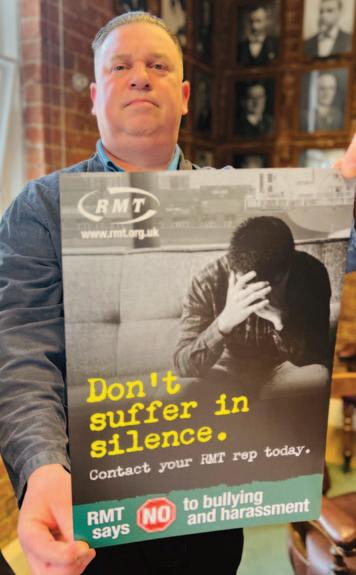
legislation. The reality is that this is never going to be delivered by a Tory government of billionaire bankers in hock to the Chamber of Shipping and global logistics firms such as Maersk and DP World.
UK ratings need an end to Tory misrule. That is why RMT General Secretary, Mick Lynch and I are publicly calling for a UK general election now.
Last month the new Australian Labour government decided to establish a Maritime Strategic Fleet of up to 12 vessels by June 2023, which will be Australian-flagged and Australian-crewed.
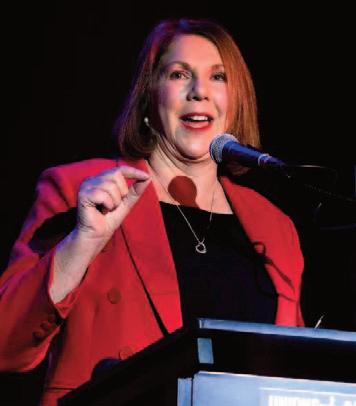
Australian Transport Minister, Catherine King said: “Australia relies on shipping to support our economic and social wellbeing, with an incredible 99 per cent of goods trade moved by sea. It is essential we make sure Australia continues to have a robust supply chain, so we get food, fuel, medical supplies, and other critical cargo to support Australian industries, the community and protect our national interest.”
Can anyone imagine a Tory government minister in Britain saying that? No, me neither.
In February, I chaired RMT’s Special General Meeting in Leeds, our union’s highest democratic body, called to consider changes to RMT’s Rules and constitution. For RMT members voice to be heard in our union, it is important we continue to become more inclusive, accountable and democratic.
The RMT President’s role is said to be the guardian of our rules and constitution. The role of President originated in 1871 in the first national rail workers’ union, the Amalgamated Society of Railway Servants, elected each year by delegates at the union’s Annual General Meeting to ensure the decisions of the AGM were adhered to by the Executive Committee and Officers.
Alex Gordon, National President reports – I took up my role as RMT National President in January 2022 and the year, so far has been eventful. We fully expected RMT members would face an onslaught from employers using the smokescreen of Covid recovery to attack our jobs, terms and conditions – AND WE WERE RIGHT!
RMT General Secretary, Mick Lynch and I are publicly calling for a UK general election now
When the National Amalgamated Sailors’ and Firemen’s Union of Great Britain was first founded in Sunderland in August 1887, a Mr. Stewart presided at its first meeting. However, NAS&FU General Secretary, Havelock Wilson wanted a ceremonial figurehead as President. He invited Samuel Plimsoll, Liberal MP for Derby, known as ‘the Sailors’ Friend’ for his invention of the ‘Plimsoll Line’, to become President of the NAS&FU. When Plimsoll retired the position was not filled.
Almost a century later, the National Union of Seamen agreed to establish a position of NUS National President at its 1986 Biennial General Meeting in Liverpool. The position was created for former NUS General Secretary, Jim Slater who chaired the NUS 1988 BGM in Hull before he retired in 1989.
In 1990 John Allan, Chair of the NUS Executive Committee chaired the NUS BGM in Aberdeen. Later that same year the NUS merged with the National Union of Railwaymen to form the RMT.
As a President for all RMT members (Maritime, Offshore and General grades), I am determined that our current NEC carries out its decision to consult with RMT Regional Councils over the need to
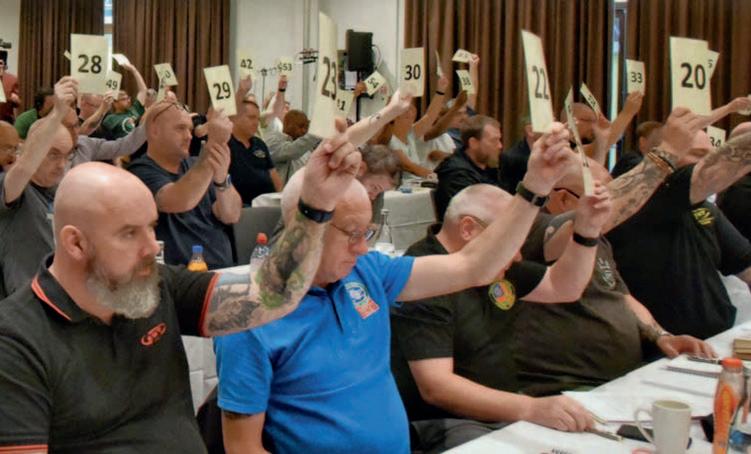
strengthen our sectoral representation for seafarers and Offshore Energy workers.
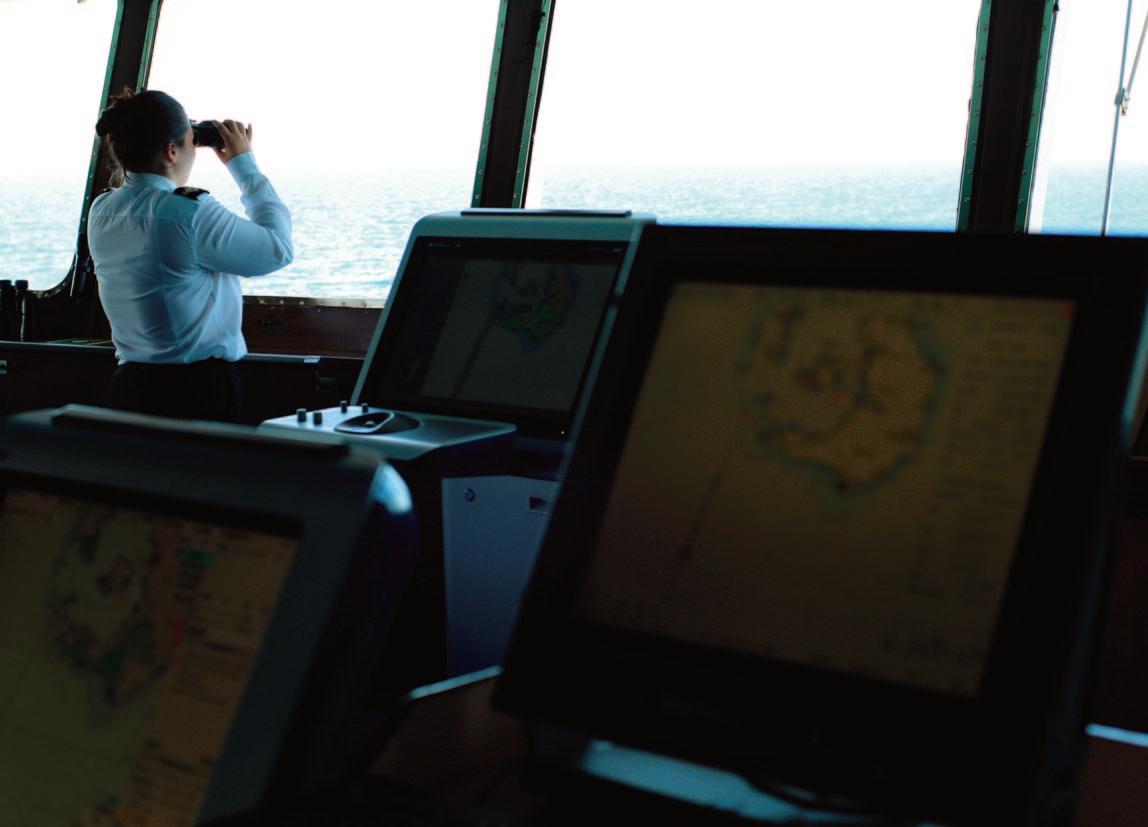
One major step forward in this direction will be to ensure all RMT members employed in the deep sea, ferries, docks and offshore sectors can participate in electing Maritime & Offshore representatives to the NEC and AGM of our union on a sectoral basis. It may surprise some members to know that even some 32 years after the amalgamation of NUS and NUR to RMT,
we have still not yet integrated all of our members into a unified democratic structure.
With attacks on our members in the workplace like never before and the growth of new industries in offshore renewable energy, there has never been a more important time to make sure as the old NUS motto says, that we ‘all pull together’.
Alex Gordon, National PresidentAny RMT member that has ever used the union’s freephone helpline will have spoken to a member of Industrial Relations department based at Unity House in London. ‘IR’, as it is commonly known, represents the hub of the union, dealing with issues that affect members on a day-to-day basis. This frontline department will deal with anything to do with a member’s terms and conditions and will give advice on a multitude of issues.
The Department has also taken responsibility for the Advice line and gives advice on non-work related matters. This is not a legal helpline but the department can give advice on many issues. Where this is not possible, for example where financial advice or family law (including divorce) advice is requested then they can point you in the direction of Solicitors or professional advisers approved by the Union.
When it comes to work related matters the department can assist with issues such as rosters, rates of pay, leave, disciplinary and grievance matters, the difficulties around PT&R (Promotion, Transfer and Redundancies), severance and ill-health severance. In short, anything that is work-related, this department will deal with.
IR also co-ordinates all pay claims and conducts all referendums. It conducts all industrial action ballots and most members will know that conducting Industrial Action Ballots is a very important part of the union’s strategy in defending members’ terms and conditions and is fraught with legal difficulties. We can expand on this point and provide you with further information on the balloting process to assist in members’ understanding of the complexities.
First of all, when a report is received from your Regional Organiser or a resolution from your RMT Branch, this will be placed before the National Executive Committee for consideration and if it decides to declare a dispute with the Company, the IR Department will write to the Company listing the issues in dispute. This forms the first part of the legal notices. Then the NEC may take a decision to conduct a ballot for industrial action, which can consist of strike action and/or industrial action short of a strike. It is usually beneficial to ballot members for both forms of action to give more options later on but this does not mean that any action will necessarily be called.
The IR Department then has to prepare the legal notice of ballot, ballot paper and ballot info sheet. This starts with an exercise to make sure all members details are correct including their workplace, job title and contact details. A data file will be sent to your Regional Organiser who will arrange to check and update your details. This is especially important as the Company is notified of the number of members at each workplace, the number of members in each job category and the total number of members concerned – if this information is not correct it can lead to the Company challenging the ballot and in some cases, means we have to call off the ballot and start again.
Each member included in the ballot will then be sent a ballot paper and ballot info sheet by post from Civica Election Services with a freepost return envelope. These will give the member the opportunity to vote for industrial action and the ballot info sheet provides further information on the dispute. We aim for at
least a 3 week balloting period before the closing date and we are able to send out replacement papers to any member who hasn’t received them during this period.
On the ballot closing date, Civica Election Services will send a report of voting to the IR Department giving the result. Under the current legislation, 50% of the total number of members who were balloted must have returned their ballot and 40% of the total number of members who were balloted must vote ‘yes’ for action to be able to take place. You will receive reminders from us during the course of voting as if we don’t meet these thresholds then the ballot will fail.
Once a successful ballot mandate has been achieved, which meets the above criteria, then the NEC can take a decision to call industrial action and again, the IR Department will conduct a further check on members details, paying particular attention to any differences in figures since the notice of ballot due to members joining, leaving, or changing jobs. We will then send the legal notice of action to the Company and inform you of the details of the action.
The whole process, from sending the notice of ballot, to the first possible date for industrial action, takes at least 6 weeks. A week between the notice of ballot and ballot papers posted to members, 3 weeks balloting period, then two weeks’ notice of action before the action starts. After 6 months from the ballot closing date, the ballot mandate expires and we have to re-ballot members again from scratch if we want to continue taking industrial action. The IR Department will start the process in good time to make sure the new ballot closes before the first ballot expires.

Originally our Legal Department began with the assessment of cases only and referred the running of cases out to external providers. However, this approach was developed and changed a few years ago and today they deal with all cases from assessment to the case’s conclusion at a tribunal for our members in London and the South East and the North West of England, for members in other areas our Legal Department provides advice and if required will instruct our panel solicitors local to that area. Our Legal Department has also set up links with lawyers in the Republic of Ireland and the Isle of Man so that we can provide legal services to members.
Our Legal Department provides the advice and arranges the appropriate representation if the claim is deemed to have reasonable prospects of success. It does not provide direct funding to members for their own choice of legal representation, instead it provides representation itself or through our panel solicitors.
In 2021, our Legal Department has also submitted claims to the Employment Appeal Tribunal for our members who have been unsuccessful with their claim at the employment tribunal and the basis for an appeal has been identified.
The Union’s helplines for work and non-work matters continue to provide enormous benefit to our members.
The Union’s Legal Department is now firmly established and employs four solicitors. The biggest call for assistance remains dismissal cases. Added to this the number of settlement agreements (members leaving their employment through negotiated agreement). The second largest call for legal assistance was to recover monies unlawfully deducted
from our members’ wages. The third largest call was for members with their discrimination claims. Our In-house Legal Department are robust in fighting all forms of discrimination in the workplace; this is evidenced by the successful case outcomes. Other members required assistance with whistleblowing and trade union detriment claims.
Our Legal Department are dedicated to assisting our members where there are reasonable prospects of success. Sadly, we are unable to support all cases where there are not reasonable prospects of success. However, this Union is not adverse to take on a case, despite the advice, where the NEC considers that, notwithstanding the prospects of the case, there are important political reasons to support locally. We remain a democratic fighting Union so it is no surprise that employers are using the law to get rid of our members and we will instruct our solicitors to fight those cases where we deem it necessary.
Our In-house Legal Department continues to advise and support members in their work-related criminal cases in the Magistrates Court. This often involves defending members against false allegations made by the public of assault, false allegations of theft and alleged driving offences. Furthermore, we continue to offer advice and support for bus and taxi drivers, in respect of their licensing issues, licensing appeals before the Magistrates Court, driving offences, and in respect of appearances before Traffic Commissioners.
Our In-house Legal Department will continue to strive to deliver a first class service to all of our members. We are committed to provide a strong legal department to assist the Union through the ever-changing legal landscape. Their successes have grown yearly. It is important going forward that we have a legal service fit for the challenges that we face.
The RMT Legal Department has achieved a number of successes at the Employment Tribunal, Employment Appeal Tribunal and in settlement negotiations for ongoing cases.

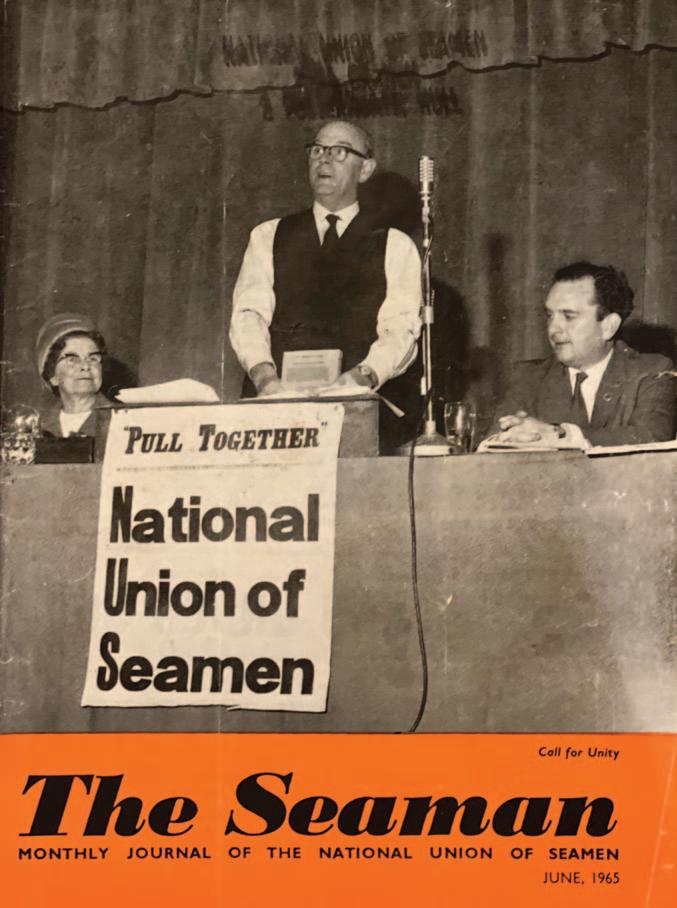
The new pay and hours structure was approved by 44 votes to 21, seagoing delegates only voting.
Weekend work should be restricted to watch keeping and essential duties. Technological advances in shipping and shipbuilding, rapidly increasing the spread and size of vessels, automation, crew rationalisation, manning reduction, reduce the cost of managing. Seafarers should share the benefits of such technological advances through shorter hours, improved leave and increased wages.
Overtime for public holidays at Sea, outside the sunday at sea compensation payment, should be paid.
A resolution for time and a half overtime rates for Saturday work and double time for Sunday work in port on Articles was referred to the Negotiating Committee. A resolution for an increase in the differential pay between lamp trimmers and AB’s was referred to the negotiating committee.
For pump-men on old tank vessels, wages should be set up according to the tonnage, as at present applies to Bosuns and Carpenters.
Working conditions and hours agreement on a run should be the same as for normal home trade or foreign-going agreement, whichever is applicable to the run voyage involved, and the mileage payment should be substantially increased.

Payment from the time of engagement to the time of discharge was demanded. In port hours for catering ratings in passenger vessels should be the same as for cargo vessels, ie, hours to be worked should be eight hours between 6am and 7pm.
The spread over period of hours worked in the catering department should be reduced.
A resolution that ordinary hours of duty
days be limited to 7am and 6pm was referred to the Negotiating Committee.
Every member whose Annual Leave includes a Bank or Public Holiday should be compensated by a day, or days, in lieu.
An increase in the amount of Annual Leave to 30 days was called for.
Sundays at Sea should be such that a full day’s leave is paid if more than four hours are spent at sea.
The subsistence allowance while on leave should be increased to a figure more in line with present day costs.
A look back in time reveals what our predecessors where campaigning for in 1965, some issues still remain very relevant today! Let’s take a look…..
The question of payment for captive time should be vigorously pursued.
There should be a larger payment for the AB’s certificate.
1964 AGM resolutions calling for incentive payments for to take fire fighting courses and for lifeboat certificate pay and for all ratings should be pressed with the view of implementation.
The union should press for a minimum payment of three hours overtime as compensation to crews of vessels called upon to shift ship in port outside the normal working hours.
Free railway tickets to signing-on ports or home if nearer, after completing one foreign-going voyage or one month on articles, should be issued to our members.
A substantial payment should be made to seafarers required to travel out of the UK to the continent of Europe to sign on vessels, this payment additional to wages already agreed.
The qualifying period for the North American bonus should be reduced from 3 months to one.
Food should be provided by the owners on all home trade and coastal vessels.
All crew messmen should be adult ratings.
Electric lighting should be available on all ships at all times while a crew is on articles.
A substantial increase in established seafarers benefits was called for.
Working gloves should be supplied on all home trade vessels.
The union should resist any further reduction in the number of crews, in order to halt unemployment in all departments.
The union should take a firm stand against shipping companies whose crew managers discriminate against good members of our union. The AGM gave the EC the necessary power to deal with job victimisation problem, if necessary by withholding labour from any offending shipping company.
When a vessel leaves port, derricks and hatches should be secured while at the berth instead of after sailing.
Seamen’s identity cards and discharge books should have endorsed thereon the blood group of the individual concerned.
Attention of the board of trade should be drawn to the deplorable conditions for passenger and crew onboard the Dover-Dunkerque train ferries, ss Shepperton ferry and ss Hampton ferry.
Pressure on British Rail, who persist in chartering foreign Tonnage for their coasting trade, was called for.
The labour Government should take immediate steps to delete from the Merchant Shipping Acts the penal clauses. The Government should also set up a joint commission to revise the 1894 Merchant Shipping Act.
The union should pursue a vigorous campaign to encourage members to to contest seats on local councils and so help to facilitate the well-being of our membership.
A resolution calling on the Labour Government to take positive steps towards building a national shipping line, owned and operated in the interest of the British nation with ships built by British workers, was referred to the national officers.
The formation of a Seamen’s Cooperative shipping company should be examined.
The union should continue to press forward to the goal of one union for all seafarers.
In order to achieve common policies on major industrial questions, the International Transport Workers’ federation should be urged to encourage exchange of delegations between Seamen’s unions.
The negotiating committee should, where possible, deal with all outstanding resolutions adopted at past AGM’s.
This content was taken from The Seaman June 1965 issue.
My dad drove me to Southampton docks with my packed suitcase and as he walked me from the car towards the towering structure he told me that everything would be okay, I would be looked after and that some of his friends would keep an eye out for me.
He was right, those friends that looked out for me were comrades from the NUS, my dads friends had now become comrades to me.
The Union in the merchant navy has always been more than just a Union, it’s a family, it’s a social structure that makes you feel safe, it’s great people having some great times together and when need be it’s great people sticking together and fighting for our rights, shouting, demonstrating and striking together.
are very rarely taught today, those lessons I was taught then are what I try to bring to the table now 36 years on through my Union activities.
I’d like to take this opportunity to tell you about my Union involvement from the very beginning up until the present day, and also let you know a little bit about my life and sea going career so far.

I was born in 1969 in Portsmouth, my mother was a housewife and my father was a merchant seaman. From the very start I wanted to follow in my fathers footsteps and join the merchant navy, the thought of travelling to those far off places with the friendly, lively, funny group of people that my old man called his friends and comrades was all I ever wanted to do.
I was taken at a very early age to Southampton’s Flying Angel club and to other clubs and bars around the docks, given the obligatory Coke and crisps and asked to wait outside while the old man would attend what I was later to discover were NUS Union meetings.
On May 16th 1986 I joined my first vessel, the mighty QE2, Cunards flagship and the largest ship afloat at that time. It was a very daunting experience for a 16 year old boy with no life experience and I can honestly say that I was absolutely crapping myself.
The 80s were a decade of strikes due to Thatcherism, we had no choice we were fighting for our jobs which we were losing due to various factors and also the ease at which companies could fly flags of convenience and exploit cheap labour.
After 36 years at sea I am still a proud Union member and a representative in PNTL, we have 95% Union membership and we are still fighting the same fights that I have been fighting all of my life. I spent 7 months last year sat around the table with comrades and the bosses rewriting our terms and conditions, we went this way then that way, backwards and forwards with no end in sight until 7 months in we felt like we had something that we could present to the members onboard the ships. The Ts&Cs were accepted unanimously and I felt a great sense of relief and also rather proud that I had been part of the machine that had fought for the changes that were now written and signed off. I would just like to say that as time has gone on, not everybody has been happy with some of the changes and being one of the members involved in negotiations I have had my fair share of criticism, however I won’t give up I’ll be there when we renegotiate the Ts&Cs, I’ll do it because that’s who I am, I’m a Union man through and through and I’ll keep fighting for peoples rights until I take my last breath.
Now it was my turn to attend meetings at the Flying Angel club in Southampton with the crews I was sailing with on the ships, alongside my dad and great Union men such as Danny Mcquaid and Frank Welsh. These men and my shipmates taught me lessons in life that
Throughout all of the changes over the years, the merger of the NUS with the NUR to become the RMT, throughout all of the ships that I have sailed on and all of the thousands of people I have met along the way, there is one thing that hasn’t changed and that is the comrades that I stand with today, they are exactly the same, different people with different names but they are still the same in their hearts as the comrades that I stood with all of those years ago and who I will continue to stand beside until my dying day.
Unity is Life and Life is Unity. Solidarity brothers and sisters.
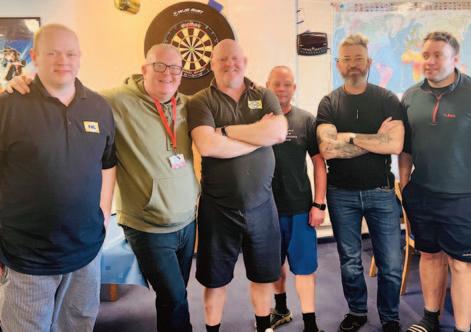

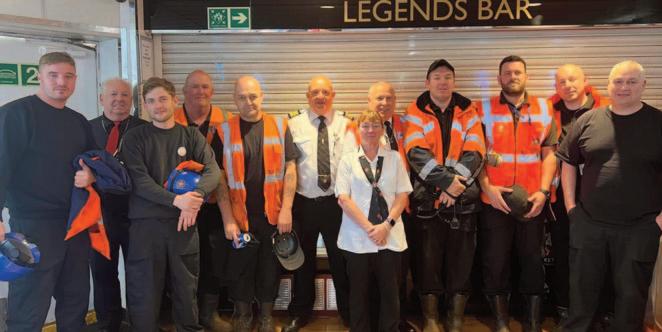
The National Secretary, Darren Procter recently visited members serving onboard a number of vessels and has addressed members on current industrial matters with their employer and gave an update on the importance of key Maritime campaigns whilst identifying the importance of members becoming active within the union and participating in union activities.
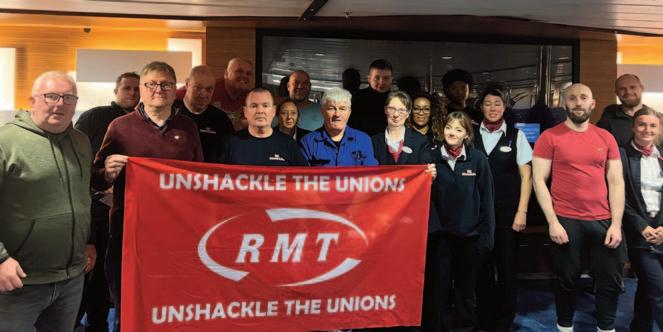

 Onboard the Stena Europe in September
RFA vessel visit
With regional organiser Daren Ireland onboard vessel Stena Adventurer
Onboard the Stena Europe in September
RFA vessel visit
With regional organiser Daren Ireland onboard vessel Stena Adventurer
All RFA members – by now most of us will of seen the pathetic pay offer received, and I say this in light of the offers made to civil servants and the armed forces both considerably better than our offer.
I have read people already slagging Union off, saying they won’t fight etc. Now I am not going to say anything against any one’s personal beliefs. I will say this though I come from a mining family and suffered the miners strike as a kid and watched Maggie ruin the coal industry and effectively the unions. The thing is though irrespective of this, people still decided to fight a lost cause
and continued to support and be a member of a union. Now some might say why, the reason why is because they wanted to have a voice and have a say wether it made a difference or not. Now all those people who chose not to be a union member as this (in my opinion is a crucial time) I ask you this do want to have a voice do you want be able to say win or lose I stood up and tried to make a difference ????? I know I certainly do just like my Dad did before me many years ago. I was proud to say he stood on pickets lines and attempted to make a difference.
So once again fellow seafarers and
fellow family members who aren’t union members let’s not get into a pissing argument over what the union will or won’t do, join up and let’s have our day together as one and not a tired disjointed group. Whether you believe it or not the only way for you to have a legal and recognisable voice in this is to become a part of the union.
LETS FIGHT TOGETHER AGAINST THESE TIGHT FISTED PEOPLE WHO THINK WE ARE IRRELEVANT. I know I am prepared to do just that win or lose.
https://seafarersafetynet.org/
The new Safety Net website is full of money management and other free resources, specifically to boost the financial resilience of UK merchant seafarers during the cost of living crisis, and was launched at the MNWB’s Port Welfare Conference last May. For more information, please see the following link to the press release: www.mnwb.org/news/ support-for-seafarers-during-cost-of-living-crisis/


MNWB and The Seafarers Charity have joined forces to launch the Safety Net for all UK merchant seafarers.
It started out that I would be attending purely out of convenience as I am from Liverpool and our usual senior RMT rep was celebrating his birthday at the time. It was pointed out that as a Health and Safety Rep., Mental Health Rep., and possible future Department Rep that it would be a good learning experience for me and a chance to learn more about procedure. I also personally believe that ship’s reps are leant on far too much by members and that it is everybody’s duty to help lighten the load if possible. I had no immediate plans to go any further than that at this time but I was willing to dip my toe in the water for the experience. It would also be an opportunity to put names to faces and do my bit as an active RMT member.
I attended the meeting with an idea in my head that I was to take notes for the senior on board reps, soak as much in as I could and vote as I believed the Harwich Shipping Branch members would to the best of my ability. I wouldn’t say that I was nervous because public forums have never been a problem to me but to say that I wasn’t cautious would be a lie. I didn’t want to appear out of my depth and look like I was a fish out of water in an environment I didn’t belong in. This was owing to the self admission that although I would say I’m a confident person in new environments, I was all too aware that I was ignorant to a lot of procedure, terminology and documentation. These trepidations were gone by lunchtime of the first morning. Although there was a procedure to adhere to and processes to be observed, the representatives in the room were polite,
courteous, patient but most of importantly of all, friendly and welcoming. I was quickly assured that as a fellow comrade I had every right to be in that room and it was appreciated that I had shown interest. I took a great sense of accomplishment from this and decided to fully immerse myself into the proceedings and not only learn from the experience but enjoy it.
strong and proud, exterior leadership qualities, really friendly and accommodating people. We shared views, strategies, ideas, experiences and more than one or two laughs.
The 2 day meeting was a very enriching experience for me and fast forward 1 month later it was decided on board that I was ready to take on the mantle of department rep. 6 weeks ago the idea of that would’ve been ridiculous to me as I would’ve thought of myself as being vastly inexperienced but them 2 days taught me that we aren’t alone as reps. It’s everybody’s duty to help the reps out. There is a wealth of experience on each vessel and it is there to be tapped into as and when it is needed.
After the 2 days had concluded I came away with more positives than I thought possible from a meeting. I very quickly learned that the RMT, as any and every other union should be, is not for the ‘people at the top’ to do the work for the regular members. The people at the so called bottom are more important than anyone else because they are the boots on the ground, the masses, and the people who make the day to day differences where it counts. The reps in that room were there to liaise on their behalf and it was our privilege to do so.
I met some good, honest like minded brothers who were, in spite of their
The reps job is exactly that, a representative. A voice to speak for those who lack the confidence, an ear to listen to our comrades concerns, a comforting shoulder to a vulnerable colleague or a firm hand of support and guidance for any who require it. But that doesn’t mean that any one man or woman needs to possess all of these qualities like I previously believed. That is what the pool of experience on board the vessel is for.
If you happen to be a person who is well informed on health and safety, CBAs, hygiene, pensions, administration, social media or absolutely anything that can help, then it is your duty as an RMT member to assist where you can. For that’s what we are, that’s what unity means and its sometimes easy to forget that.

There is a wealth of experience on each vessel and it is there to be tapped into as and when it is needed.

 explained by Andy Gordon, Oban Shipping and NEC Member
explained by Andy Gordon, Oban Shipping and NEC Member

The National Executive Committee is made up of 16 members who deal with the daily running of the union. This is made up of 4 sub-committees; Northern, Midlands, Southern and Maritime. Each sub-committee is made up of four NEC members and within the Maritime sub- committee we have a representative from each of the 4 maritime regions. The Maritime subcommittee includes myself, Andy Gordon representing Maritime Region 3, Sean Miskimmon of Liverpool Shipping representing Maritime Region 2 and Dale Kember of Dover Shipping Branch representing Maritime Region 1.
Each NEC position is elected from the membership within your respective
region for a period of three years and then you return to your employer. The positions are staggered over 3 years but always start from 1st January.
The role itself involves dealing with resolutions from branches / regions, reports from lead officers / regional organisers and any matters placed before the NEC by the General Secretary such as legal assistance requests, organisational matters and financial reports etc.
Within my region the National Executive Committee member is elected from members of the following branches: Aberdeen Shipping Branch, Belfast Shipping Branch, Glasgow Shipping Branch and Oban Shipping Branch.
Given that I was elected into this position as a member of Oban Shipping
The loudest and most spontaneous cheers at the Annual General Meeting were those which were given to welcome miss Lilian Steel, 38 year old stewardess, the first woman to attend an AGM.
And what did Lilian think of it? Quite a lot. At the end of the first day she told Rosalie Macrae (Daily Express): “Now I feel like a dyed-in-the-wool trade unionist and a real seawoman.”
Lilian, a delegate from the Tilbury and Gravesend branch hails from Northfleet, Kent. On leaving school she became a nurse and went to Australia in that capacity. But she wanted to see more of the world than is visible from hospitals and got a job as a stewardess. The next eight years she spent crossing and re-crossing the seven seas.
“I love the life” she told Miss Mcrae. “I love every minute of it. It’s just the job I coveted since I was a girl.”
Lilian has clear views as to what needs to be done to improve the conditions of stewardesses, though she has no specific complaints on her own account.
An article taken from The Seaman AGM issue of November-December 1962
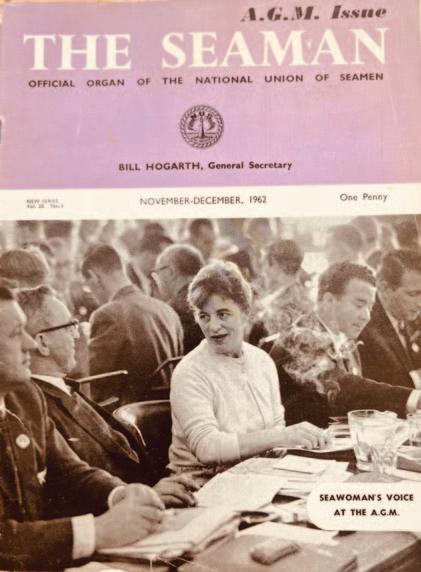
Branch, no member of Oban Shipping Branch can be elected into this position because no branch can be represented consecutively on the National Executive committee.
My term will conclude on the 31st December and Davey Douglas has been elected to take up the role by members within my region. I wish Davey the very best of luck in this very important role.
I was first approached to deliver Mental Health Awareness training to a maritime charity back in 2016. In order to deliver this, I undertook a year of research into the impact of going to sea on mariners mental health. This included completing a ship visitors course and interviewing seafarers from across the maritime industry. The research highlighted considerable gaps in mental health support across the sector. Our 3-day course was developed to cover Safeguarding People and Mental Health Awareness, including self-harm, suicide prevention, bereavement and loss. The pilot was a success and it was soon rolled out to maritime charities across the UK for support staff and ship visitors.
In 2018 I was approached by Royal Fleet Auxiliary (RFA) second officer, Ian Johnston MBE and the Commodore of the Royal Fleet Auxiliary (RFA) to deliver the training to all staff and personnel. We started delivering our training in August 2018 to small groups of learners. To date we have trained 606 RFA personnel and we have a 5-year contract with the MOD going forward. Alongside delivery to the RFA, we have delivered to almost 1000 seafarers in total, including cruise ship staff, fishers and the crews of Sir David Attenborough (British Antarctic Survey). We are about to roll out an identical programme to the whole crew from PNTL over the next year.
The course is empowering to all seafarers. On entering the training room some are sceptical, expecting one thing and leaving the training room with a completely different outlook on Safeguarding and Mental health with a renewed empathy of others. The course takes seafarers into some emotionally deep places, it is extremely reflective both personally and professionally. To date, out of the number of seafarers trained we have received 442 disclosures from
seafarers of the RFA with issues that impact their Mental Health as well as 123 disclosures from other seafarers. Our unique approach means that we support seafarers after the training is complete if required. We have supported every single one of these seafarers outside of the course with appropriate help or signposting to support them to move forward.
Disclosures include many things, personal and professional, that have impacted on their Mental Health including but not exclusive too PTSD, long hours, lack of resources, demands of the job on physical health, burnout, alcohol dependency, debt, sexual harassment or assault, domestic violence, bullying, bereavement and loss, family problems, separation from family, lack of shore leave, fear of criminalisation or job loss, isolation, self-harm and most seriously suicide ideation. The reasons seafarers may be struggling are wide and varied.
However, coming on the training has in some cases been ‘life saving’. We have had hundreds of feedback forms evidencing the difference attending the training has made to seafarers lives both
personally and professionally. Some seafarers have disclosed changing their own behaviour as a result of coming on the course, where they have realised that their ‘banter’ with crew mates was verging on bullying. We have supported several seafarers to find help and support with their personal problems that impact on their mental health whilst at sea. Through coaching and mentoring we have helped several seafarers to build their self-esteem and resilience in order to progress in their seagoing career.
This article can only capture a snapshot of the difference the training makes to seafarers of all ranks, ratings and shore-based staff. We have enough material to fill the magazine with seafarer stories that highlight the importance of Mental Health Training, spotting the signs that a crew mate is in a low place, raising issues, speaking up and knowing that the organisation will take them seriously and help them to overcome the difficulties they are facing instead of being punitive or dismissive.
This training programme represents cultural change, we have a long way to go before all seafarers feel confident to talk about issues impacting on mental health and a long way to go before all shipping companies or companies with ships recognise the importance of reducing the stigma attached to seafarer mental health. The RFA have invested in their people with this training programme, leading the way on raising Safeguarding and Mental Health Awareness within the maritime sector.
Maritime charities are working extremely hard to support this change and Freedom Training and Consultancy Ltd is honoured to be part of this and proud of the difference our training has made to the lives numerous seafarers to date.
To find out more about this training please email info@freedomtrainingandconsultancy.com
Seafarer Hospital Society is working in collaboration with The Robin Cancer Trust to raise awareness of testicular and ovarian cancer.
Our mission is to stop young adults dying from germ cell cancer – we save lives and we do this by:
• raising awareness of testicular and ovarian cancer through our lifesaving cancer campaigns and engaging young adults with our digital education programmes.
• offering support and providing free materials to newly diagnosed young people going through treatment, helping to make the most difficult time of their life a little easier.
• creating meaningful connections with survivors through our Ambassador programme, giving a voice to those affected by these rare forms of cancer.
Our vision is to reach every young person in the UK with our life-saving cancer campaigns by 2024. Our 2 campaigns are #TalkingBollocks and #NotOvaryacting
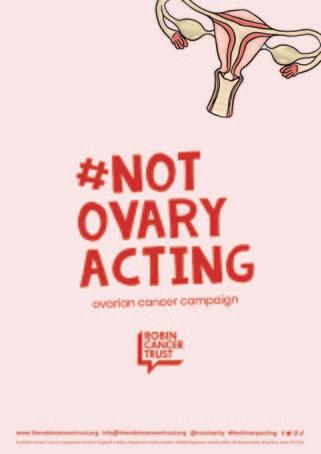

The Robin Cancer Trust was founded in 2012 by the Freeman family following the untimely death of their son and brother, Robin Freeman, aged just 24.



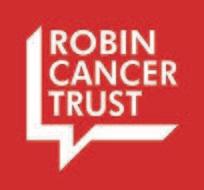
Robin was diagnosed in the prime of his life in 2011 with a Mediastinal Germ Cell Tumour. Following 10 months in treatment, including several rounds of chemotherapy and a stem-cell transplant, he was told there was nothing else his medical team could do. He passed away surrounded by his loved ones on December 10th 2011.
His family promised him that ‘he would never just be a photograph on the wall’ and that something good would be born of his tragedy. Robin inspires us to raise awareness, reduce embarrassment and save young lives through the early detection of germ cell cancers.
Since 2012, we have reached 12 million people online, engaged with over 175,000 men and women in the community, and delivered life-saving educational talks to over 25,000 young adults in schools, colleges & businesses across the region.
For more information please visit therobincancertrust.org
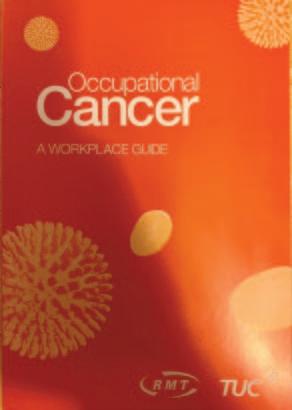
The Code of Safe Working Practices (COSWP) Code details the regulatory framework for health and safety on board, safety management and statutory duties underlying the advice in the Code and the areas that should be covered when introducing a recruit to the safety procedures on board, aspiring to provide guidance on improving health and safety on vessels and also articulates how statutory obligations should be fulfilled.
The Code is addressed to everyone on a ship regardless of rank or rating, and to those ashore responsible for safety, because the recommendations can be effective only if they are understood by all and if everyone cooperates in their implementation.
Some risks include:
• ambient factors, such as noise, vibration, lighting, ultra-violet light, non-ionising radiation and extreme temperatures
• inherent hazards, such as the vessel’s structure, means of access, ergonomic hazards and hazardous materials such as asbestos
• hazards arising from work activities, such as work in enclosed spaces, use of equipment and machinery, working on and below deck in adverse weather, dangerous cargo and ballast operations, and exposure to biological hazards or chemicals
• health risks, such as fatigue and impacts on mental occupational health
• the emergency and accident response.
It is the duty of shipowners and employers to protect the health and safety of seafarers and others so far as is reasonably practicable.
are:
• the avoidance of risks, which among other things includes the combating of risks at source and the replacement of dangerous practices, substances or equipment by nondangerous or less dangerous practices, substances or equipment
• the evaluation of unavoidable risks and the taking of action to reduce them
• the adoption of work patterns and procedures that take account of the capacity of the individual, especially in respect of the design of the workplace and the choice of work equipment, with a view in particular to alleviating monotonous work and to reducing any consequent adverse effect on workers’ health and safety
• the adaptation of procedures to take account of new technology and other changes in working practices, equipment, the working environment and any other factors that may affect health and safety
• the adoption of a coherent approach to management of the vessel or undertaking, taking account of health and safety at every level of the organisation
• giving collective protective measures priority over individual protective measures
• the provision of appropriate and relevant information and instruction for workers.
• take reasonable care for their own health and safety and that of others on board who may be affected by their acts or omissions
• cooperate with anyone else carrying out health and safety duties, including compliance with control measures identified during the employer’s or Company’s risk assessment
• report any identified serious hazards or deficiencies immediately to the appropriate officer or other responsible person
• make proper use of plant and machinery and treat any hazard to health or safety, such as a dangerous substance with due caution.
This Code published by the Maritime and Coastguard Agency (MCA) is endorsed by the National Maritime Occupational Health and Safety Committee, UK Chamber of Shipping, Nautilus International and the RMT as best practice guidance for improving health and safety on board ship.
The MCA is currently undertaking a fundamental review and redevelopment of COSWP.
There is a requirement for all UK flagged vessels to have access to COSWP onboard and it is nationally recognised as a standard of guidance and best practice.
This review will lead to a new COSWP edition which retains its usefulness and credibility but with improved functionality and accessibility.
Please have your say on COSWP; RMT undertook a survey last year, the results of which have been included in our ongoing discussions with the MCA on the subject.
We are now seeking members’ views on examples of potential new styles for COSWP and feedback on improvements that could be made.


It recently emerged during a NMOHSC (National Maritime Occupational Health and Safety Committee) which your union attends, that reservations had been raised around the carriage and charging of electric vehicles onboard vessels.
It has been reported that during a conference in Norway, experts had warned against the use of salt water to tackle a Lithium Ion battery fire, as the
salt could generate hydrogen and cause an explosion. Fire brigades had assumed that fresh water would be used to tackle battery fires. It was stated that the MV Felicity Ace, which had been a total loss, had burned for a long time because of all the batteries onboard.
Some operators have recently installed thermal fire blankets on car decks, but this raises concerns around safety of those going onto vehicle decks
to put blankets onto blazing vehicles.
We have requested input on this concern from the FBU (Fire Brigades union) and will report back to members on this matter.
In the meantime we would like to hear from members surrounding any concerns you have or dialogue surrounding this matter that has taken place onboard your respective vessel.
The International Maritime Organisation (IMO) describes Fatigue as “a state of feeling tired, weary, or sleepy that results from prolonged mental or physical work, extended periods of anxiety, exposure to harsh environments, or loss of sleep”. This results in a “reduction in physical and/or mental capability as the result of physical, mental or emotional exertion which may impair nearly all physical abilities including: strength; speed; reaction time; coordination; decision making; or balance”.
Fatigue and its effects on seafarers have been studied and researched by several organisations and institutions including, Maritime Coast Guard Agency (MCA), Cardiff and Southampton University, and Warsash Maritime Academy. International partnerships have been formed to research fatigue and their findings published in the forms of Project Martha and Project Horizon to name a few. Fatigue could well be one of the most researched issues within the maritime industry, yet how well is it
understood or recognised onboard our vessels? Occasionally documents and reports may be presented at "team briefs or safety committees" then placed back on the shelf to gather dust for another twelve months and not given a second thought. We are told by ship owners and shipboard management that safety is paramount yet how often is the fatigue of seafarers taken into consideration, even though the causes and effects of it are well documented?
Maritime Guidance Notice (MGN) 505 outlines the need for a Fatigue Management Plan (FMP). FMP are proven to reduce the risk of fatigue and improve the health and safety of crew. The plan should take into account manning levels, type of weather, workload and frequency of port visits, and length of voyage. This should be amended if any of the considering factors change. However, how many of us have seen a copy of a fatigue Management Plan on the vessels we work on, or have been invited to contribute to them?
Over the years we have seen a
reduction in crew numbers, resulting in increased productivity for individuals, longer hours worked, and length of voyages increased. These are all contributing factors that can increase fatigue, outlined by the organisations and institutions tasked with researching the subject. However, we never hear any objections from these organisations when shipping companies implement such measures that clearly have a detrimental impact on seafarers. The onus always falls on the individual to acknowledge that they may be suffering from fatigue, even though sometimes it’s difficult to recognise. In the event of an accident or “near miss” the individuals involved are asked “did you feel fatigued?”. The real question should be “How could you not have been fatigued?”
There have been enough studies providing evidence of the effects and causes of fatigue. It is now time for the relevant organisations and governing bodies to put robust, legally binding measures in place to ensure that ship owners take fatigue seriously.
It has recently come to the attention of the RMT that the Ensign Retirement Plan (ERP) is going to be taken over by Smart Pensions. The ERP is a Defined Contribution (DC) occupational pension scheme arrangement which is offered to employees working at shipping companies such as Stena Line, Northlink Ferries, PNTL and Foreland Shipping etc. We are advised that over the past year the Trustee have been reviewing ERP in respect costs and more importantly members are receiving value for money. The latter point is very important when it comes to DC arrangement as members potential retirement benefits are based on the amount of contributions going into their individual pension pot, the level of investment returns they receive over the lifetime of their membership of the ERP and level of charges deducted from their pot every year to administer the plan i.e. Annual Management Charges (AMC’s).
Following the review and carrying out details due diligence the Trustees have decided that it would be in the best interests of members current and future retirement benefits that the ERP is wound up and that members benefits are transferred to Smart Pension a Master Trust arrangement who will offer comparable benefits as those offered under the ERP.
While ultimately such mergers/ takeovers are common practice, as long as the appropriate regulatory procedure has been followed, the RMT have been in contact with the Trustee to seek further clarity on the takeover. Below are several questions we have asked the Trustee in relation to the takeover which includes their answers:
Q.
A. It is expected that over by Smart Pension will be completed in early 2023
Q. Do members have to consent to
Ensign funds being transferred to Smart Pensions?
A. Member consent is not required although members have the choice to transfer to another pension arrangement if they wish
Q. If current ERP shipping employers decide to move to Smart Pensions will they be expected to provide the same level of contributions as those currently paid under the ERP?
A. Yes, the same level of contributions is expected to continue
Q. Will the default and self-select investment funds be the same as those which are currently available to members in the ERP?
A. No, they will be Smart funds but will be similar. Note: The Smart Pension default investment strategy is designed to maximise returns whilst also being environmentally and socially friendly.
Q. Will the AMCs for the default and self-select funds be the same as those offered by ERP?
A. Default funds will have a lower AMC. Self-select funds will be generally lower Note: It is expected that for the Smart Pension default fund the AMC will be 0.25%pa compared to the ERP AMC of 0.31%. We are also advised that there will be no charges placed on members as a result of them transferring to Smart Pension. Currently 93% of ERP members are in the default fund.
Q. Will employers offer the same level of Life cover under Smart Pensions?
A. ERP does not include life cover. Life cover is a totally separate benefit and there is no reason for any existing life cover arrangements to change.
Note: Participating employers pay for the life cover via an insurance premium.
Q. Will Smart be offering some sort of digital platform for members to view their retirement savings and make changes to their account etc?
A. Yes, Smart is a fintech company and technology for members, and employers, can be expected to be of a high standard.
We have been informed that Smart Pensions are keen to engage and support the Maritime industry to ensure that members receive the best outcomes at retirement. This, we are advised, is reflected in the lower than usual AMC of 0.25%, which is 20% lower than the AMC currently offered under the ERP default investment strategy.

Those shipping employers who participate in ERP had until 25th November 2022 to opt-out moving to Smart Pension and offer an alternative arrangement to their employees. We are advised that no employers have opted out and therefore will join Smart Pension sometime in 2023.
Current ERP contributing members will move to Smart Pension unless they inform the administrator of the Plan, Aegon, before 23 December 2022.
ERP members retirement savings will continue to be invested and held securely as normal but in due course, these will be transferred to Smart Pension or if members choose a different scheme they will be transferred to the scheme of their choice.
If members have questions about the transfer, they can contact Aegon by email at my.pension@aegon.co.uk or by telephone at 01733 353495.
The RMT is not regulated to give financial advice to members but if members need such advice, we recommend they seek independent financial advice. Such advice can be sourced by visiting unbiased.co.uk government website.
Dan Crimes provides updates on two key campaign areas for the union’s seafarers
and campaigning work. One of those core politics is to increase employment and training and to end the attacks on Ratings jobs across our islands. As the P&O scandal has underlined, this is a tough ask in face of an overly powerful shipowner lobby which successive Governments have refused to regulate properly.
The Government’s underwhelming response to P&O Ferries’ illegal attacks on directly employed UK seafarer jobs is a case in point and we are currently working hard to improve the Seafarers Wages Bill to fight back against P&O Ferries and their low-cost cohorts who are doing some much damage to jobs, rights and livelihoods.
The Bill proposes a minimum rate of pay for seafarers which is equivalent to the UK NMW. The rate of pay will apply to seafarers who do not qualify for the UK NMW for work carried out in UK territorial waters. Harbour authorities (ports) would have responsibility for ensuring that operators are compliant and the Maritime and Coastguard Agency will enforce that.
The Lords stages of the Bill coincided with the chaotic tenure of right wing extremist Liz Truss as Prime Minister. Although this clearly affected attendance,
Regrettably, we were unable to amend the Bill and attention now shifts to the Commons.
The Bill needs significant amendment if it is to seriously damage the business model at P&O, Irish Ferries, Seatruck, Cobelfret, Condor Ferries and across the industry which has driven a steady decline of UK Ratings’ jobs and training since the National Union of Seamen strike in 1988.

RMT is backing a number of amendments to the Bill, including:
• Application to crew working on merchant ships calling at a UK port at least 52 times a year.
• Widening the scope of the Bill to mandate roster patterns, pension rights, crewing levels and training programmes in place at Stena Line and DFDS, where the RMT and Nautilus collective bargaining agreements are still in place.
• Preventing ‘port hopping’ and other avoidance techniques which operators may use.

• Secretary of State empowered to set a national tariff or surcharges for non-compliant operators.
• Setting consolidated, annual rates of pay for an 84 hour week, as well as
the Maritime and Coastguard Agency and HMRC.
• Detaining non-compliant vessels in port rather than denying them access.
The Government claims that an equivalent to the NMW is the only way that they can tackle seafarer pay issues without infringing international law, namely the UN Convention on the Law of the Sea (UNCLOS).
However, the Bill does not tackle nationality based pay discrimination or roster patterns, the main sources of P&O’s cuts to the paybill on international routes. For example, a Seaman Grade 1A covered by the RMT CBA on the Pride of Canterbury worked one week on one week off for a consolidated basic annual wage of over £28,250. Today, an Indian AB doing roughly the same job on the same vessel works 17 weeks straight, with no shore leave for a basic hourly rate under £4 per hour – ensuring that an equivalent to the NMW is paid in UK waters in those circumstances is unlikely to reverse P&O’s assault on jobs or conditions.
The proposed ‘Seafarers Charter’ is the Government’s method of dealing with issues other than pay. RMT and
Nautilus have been consulted on this but agreement for a maximum roster of 2 weeks on weeks off has been taken out of the Charter, despite agreement with the unions, officials and representatives from Stena Line and DFDS. The Government claim that ‘more research’ is needed.
There is also regular dialogue between the union and the DfT over the Government’s bilateral agreements with European Government’s to create ‘minimum wage corridors.’ There is an agreement with the French Government which is apparently at an advanced stage, according to the French press and our comrades in the French maritime unions CfDT and CGT. The UK Government seems less willing to make public
statements on this agreement with our closest maritime neighbour who is also affected by the crewing and flagging policies of P&O and Irish Ferries.
We have lined up the Labour front bench in the Commons and members of the RMT Parliamentary Group for the Committee Stage to pursue amendments to the Seafarers’ Wages Bill but with a number of powers to be created through secondary regulations, the Bill will not be fully in place until 2024.
Time is running out for the Tory Government and their ‘Nine Point Plan’ which was dealt a massive blow by the Insolvency Service’s bitterly disappointing decision not to press criminal charges against P&O Ferries or
their directors. We are demanding an immediate meeting with the new Shipping Minister, Baroness Vere in order to press the Government harder for effective action to protect seafarer jobs and conditions from another P&O.
Stena Line and DFDS are watching the Government’s response to P&O Ferries closely but we are in the fight to secure the future for British Ratings on international ferry routes.
RMT have set up a write to your MP facility through the TUC in order to build support for amendments to improve the Bill. Members are urged to use that and you will be kept regularly updated on the outcomes to the Seafarers Wages Bill.
Since it was introduced over five years ago, your union has consistently demanded that the Government scrap the Offshore Wind Workers Immigration Rules Concession 2017. We now have irrefutable proof that the waiver damages jobs and training for Ratings and also undermines the conditions of employment for offshore wind project crew.
Under this temporary waiver, since 2017, employers have been able to apply to the Home Office to import non-EEA crew to work on the construction and maintenance of offshore wind farms in UK territorial waters. Other concession schemes, for well boat crew in the fishing industry, for example, include approved lists of employers but since a concession was introduced in the offshore wind supply chain, the Home Office has refused to provide MPs or trade unions with any information on the employers using it or on the number of seafarers or project crew brought to work in UK waters under the waiver.
The offshore wind concession was due to expire on 31st October, having been extended six times since 2017. Ahead of that date, 36 UK seafarers, including RMT members had been recruited to replace Filipino crew, including on the Norwegian registered Solstad vessel Normand Navigator. The crewing agent, ERSG had committed to 12-months work
for our members and their colleagues on EDF’s Neart na Goaithe offshore wind farm, 15km off the coast of Fife.
However, at the last minute, the Home Office extended the waiver to April 2023. As a result, ERSG told members and their UK colleagues on the Normand Navigator that their contract would not be renewed after 9th November, when they would be replaced by the returning Filipino crew. ERSG explicitly linked this blatant profiteering at the expense of UK seafarers to the UK Government’s decision to extend the immigration waiver.
There is anecdotal evidence from UK Ratings and Officers on other vessels working on the Neart na Gaoithe and vessel on other offshore wind farms under development in UK waters that they have been replaced by non-EEA crew as a result of this extension.
RMT and Nautilus contacted the Immigration Minister, Robert Jenrick MP to demand an urgent explanation of this decision and for the Government to at least acknowledge the affect of its policy the livelihoods of domestic seafarers and their families during an escalating cost of living crisis.
Through the RMT Parliamentary Group in Westminster, the Union has also secured a meeting with the Home Office Minister, at which your Union will demand that remedial action is immediately taken to get those green
seafarer jobs back and for the waiver to be scrapped. In line with previous NEC decisions, we will be taking up a national campaign against this waiver, if the Minister refuses to scrap it.
We have also also contacted the Department for Transport, the Maritime Coastguard Agency and the Employment Agency Standards Inspectorate to demand Government action, including the removal of ERSG from the list of MCA approved recruitment and placement services for seafarers.
Since 2017, over 2,000 offshore wind turbines have been constructed and maintained in UK waters, contributing another 7GW of energy production capacity. This work should have supported thousands of local jobs. Instead, the Government has repeatedly extended a temporary waiver that is not wanted by developers but has been retained to protect the profits of shipowners at an increasing cost to seafarer jobs, training and livelihoods in a growth area of the maritime economy.
As the General Secretary, Mick Lynch has clearly stated, “RMT will not stand for this and we will not rest until we have achieved fair employment conditions for all Ratings, covered by RMT collective bargaining agreements in the offshore wind supply chain and every other sector of the shipping industry.”

Thinking of lifelong learning? Want to progress your career? We can help with a Bursary up to £500 (subject to conditions)
The RMT Learning Seafarers Bursary Scheme is available to all current RMT seafaring members, ex seafarers and retired seafarers. It can help with a variety of courses , either through local colleges, the marine society or open university.
Contact your local Union Learning rep, Shipping Branch Secretary or Paul Shaw at p.shaw@rmt.org.uk Tel; 0207 529 8813 for more information or visit our website www.rmt.org.uk/learning

